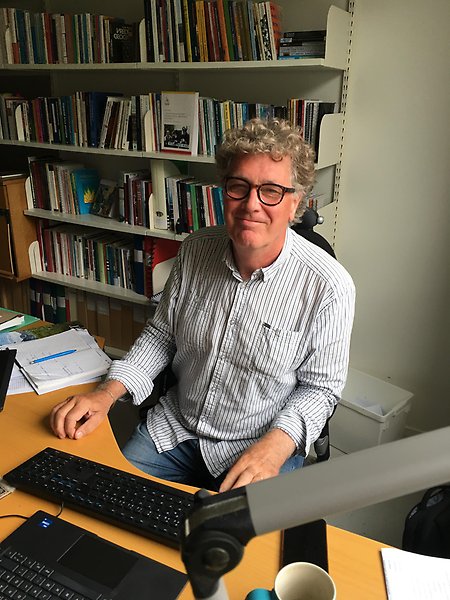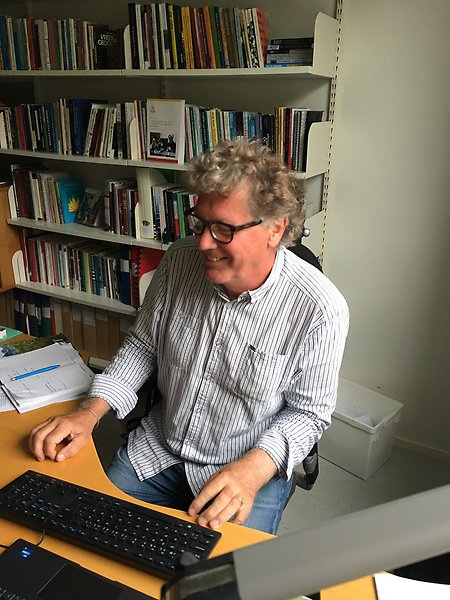Oscar Pripp
The political power in music, the ethnological ID in working life, and how good people create bad effects

Oscar Pripp.
Oscar Pripp is an ethnologist whose work revolves around culture in several ways. He studies music as a means of expression for politics and civic engagement. He also works with ethnological tools to address exclusion processes and structural discrimination in schools and working life. As Oscar has held the role of director of studies, he has become a familiar face to many who have studied at the department.
For over 30 years, Oscar has worked with diversity and migration in various ways.
-For the past ten years, I have been researching how practices among music practitioners can be an expression of resistance or social change. There is an almost clichéd idea that culture makes people democratic, and I wanted to get to the bottom of that notion. I am affiliated with the CreArt network, which is based at the Rhythmic Conservatory in Copenhagen. The network consists of about ten researchers from Brazil, Kenya, the United States and Denmark, among others, who all work in one way or another with issues of artistic citizenship, a term that refers to citizenship in the sense of social engagement. Several of the researchers are musicians who work both practically and theoretically.
One example of artistic citizenship from Oscar's research is the Dream Orchestra in Gothenburg.
-Dream Orchestra started in 2017 with unaccompanied refugees after the so-called refugee crisis, and has now grown into a huge activity for both children, youth and musicians at the highest level, who has ended up in Sweden through migration. It is an interesting example of artistic citizenship. The Orchestra is not charity or a social activity. They are deadly serious about the music, and through it they can integrate themselves. It's an approach to people as fully equals, and that's where the social benefit of music comes in.
Oscar has also studied ethnic associations, a phenomenon that has existed in Sweden since the 1970s.
-Civil society is organized around activities such as dance and music, and many associations would not exist without that glue. On the surface, it does not seem like a folk dance guild, for example, is political, but there are several dimensions to it. For example, they see themselves as an example of how an ideal society should function with intergenerational work, creativity and movement.
The research has involved one year-long fieldworks in both a Swedish folk dance guild and a Kurdish cultural association in Stockholm.
-Although the Kurdish association was religiously and politically independent, there were quite obvious political aspects to the association. For example, they were committed to opposing persecution and felt attacked by the political developments in Sweden, where migrants are increasingly under scrutiny. Within the folk dance guild, I had expected much less politics. The average age was high and most practitioners were from the well-off middle class and well established professionals. Nevertheless, it was not a conservative approach to society that was expressed in the interviews, but rather quite radical ideas about an operational society open to diversity. It turned out that many of the ideas that existed in the 70s, when they started dancing as a stand against elitism, had been maintained during the decades they danced together. They did not like at all that some people try to use folk dance as a symbol of nationalism. On the contrary, they were all aware that both music and dance are shaped by openness to influences from elsewhere in the world. By attending rehearsals and dances, filming and interviewing, I was able to dig deeper into the resistance against an undesirable social development. Even if they are not going to the barricades and proclaim their support for multiculturalism, they do perform other types of protests against the right-wing movement.
In both of the cultural associations, silence was used as a strategy for political resistance.
-To engage in debate and defend yourself when you are being accused of cultural decay, or something, is to accept the other's definition of you. By remaining silent and refusing to be defined, the other person reveals himself in his eagerness and becomes insecure. There are other examples in the world where silence and stillness reveal the other, for example, in Estonian resistance to the Soviet Union, songs and nursery rhymes were often used as a silent protest.

In addition to music research, Oscar has extensive experience working with diversity and equality in schools and organizations.
-When you go beyond who people are at the surface, you will always be surprised and get other answers to questions than you expect. Because of that, the theoretical foundations and tools of ethnology can be used to show how everyday racism and excluding processes exist in schools, working life and society. There, the societal benefit in the discipline is obvious. Structural discrimination is not something vague but very concrete. It is repeated actions linked to gender, class and ethnicity. When they happen again and again, they have real effects that can be seen in the labor market, housing market and so on. Such seemingly inexplicable statistical differences can be delved into, beyond the answers that people imagine. It is in the empirical actions of everyday life that discrimination happens very concretely.
One example is how everyday racism is performed through small acts that are not intended to exclude, but still do so.
-If someone is always subjected to the same things and receives the same offensive or exclusionary question over and over again, that person will explode the thousandth time someone asks. They have been silent and cool a thousand times before, but right then and there they are perceived as over reacting. In these contexts, it is fruitful to work with the phrase: How good people create bad effects. Those who exclude do not know about it, but those who are exposed see it all the time. So we have to teach people how to see these processes themselves, in their school or organization.
Ethnological research also has much to contribute at the political level.
-Since the 1980s, there has been a political development towards talking about migration and migrants in an increasingly culturalized way, meaning that politicians are trying to find cultural causes for social problems. By looking at the same groups in other times or parts of the world, research in ethnology, anthropology and sociology can show that culture does not exist, it is performed. Our disciplines show over and over that conflict and crime arise when society is pulled apart economically and socially. It is expressed in, but not caused by, ethnic groups. This can be seen in all countries. Where the gaps are smaller, crime is lower. We know with great certainty that even if there are short-term measures, the only long-term solution is to bring society together. On these issues, not least now with ongoing gang crimes in Sweden, our disciplines can really contribute to the political work. Unfortunately, the humanities have had difficulty demonstrating the benefits to the public and there are fewer ethnologists working in positions where they can participate in the development of society now than when I started working.
Oscar has long been the director of studies for the undergraduate program in ethnology. He has spent the last year working on an alumni survey on former students' experience of the program and the step into working life.
-When former ethnology and anthropology students are interviewed, they say that they discover an ID when they start working that they were not previously aware of. That ID could be described something like being the devil's advocate, that they always ask critical questions when claims are made about groups of people or societies. This is an important function in any organization. In my last year before retirement, I will lead change processes based on the results of the alumni survey to develop and revitalize the disciplines. Being an ethnologist is a lifestyle rather than a profession, and I will continue with certain assignments and projects even after retirement, Oscar concludes.
Text and photo: Jennie Sjödin, year 2023
